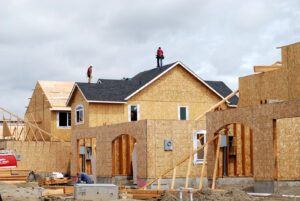Yes… Strong, the pull of new construction is.

We see this trend over and over again in all kinds of markets. Buyers are willing to spend more money on brand new homes, compared to what the market generally seems to bear, for very similar re-sale homes. The force is undeniably strong for homes that are cosmetically on-trend, sparkly new and touched only by the skilled hands of a construction worker!
But, there are many factors to take into consideration when considering the purchase of a new home.
Top 4 Things to Consider When Purchasing New Construction
- Builder contracts are not the same as general, state-approved real estate contracts and offer few protections for the buyer.
- If you are financing your purchase, your lender will most likely require an appraisal.
- Depending on the real estate market in your area, you may be responsible for purchasing many items that traditionally are included in homes that have been previously owned.
- You often can find older, re-sale homes in excellent condition with more square footage or larger lot sizes for the same price or even less money.
Builder Contracts
Builder contracts are meant to protect the builders’ interests. This is understandable, especially if the property has yet to be built and the builder is taking on most of the risk and upfront costs for building. Buyers don’t pay the builder for the home until it is ready to occupy and the sale has legally closed. That means a builder is on the hook for paying for the property even if a buyer terminates the transaction.
Having said all that, in most new construction sales contracts, buyers do not have the traditional protections (called Contingencies) for their earnest money deposit, that are included in a standard state-approved real estate contract. These contingencies generally include the ability to terminate (and receive a refund of your earnest money deposit) for reasons such as: repair issues that come up in the inspection period, or from a property disclosure statement provided by the seller, or for financing issues that are outside of the buyers’ control, including a low appraisal. Putting a deposit down on a new construction home generally means that money will go to the builder, regardless of what may occur in the sales transaction. No take-backs allowed!
Lender Appraisals
If you are financing your purchase it is likely that your lender will require an appraisal that proves to the bank the price you have agreed to pay for the home is supported by current market data for the area. In many cases, new construction will be in areas with a lot of empty space and not a lot of similar housing stock. Additionally, if you are purchasing one of the “best” homes in the development, such as a corner unit townhouse, or a unique home that backs to green space instead of other homes, there will be little support in the data given the unique, yet immensely valuable qualities of the property.
If an appraiser can’t find data in recently sold, comparable properties to support your sales price, then you may end up with a low opinion of value from the appraiser. Given the lack of a financing contingency in most builder contracts, that means you could be responsible for the difference between the low appraisal and the sales price you agreed to pay if the seller/builder will not negotiate. If that isn’t possible, you may need to terminate your sales agreement and lose your earnest money. Needless to say, this is not a fun situation for any buyer.
Unexpected Expenses
 The most common negative we’ve heard repeatedly from our new construction buyers has to do with all the unexpected expenses they had neglected to factor into the purchase of their home. This includes kitchen appliances, a washer and dryer, air conditioning, shades, curtains or blinds for all of those gorgeous new windows, and landscaping expenses. Buyers can be blinded by the bling of quartz counters, custom cabinetry, and pretty bathroom tile but miss the empty spaces where appliances and storage cabinets or shelving should be. Take stock of what is not included in the property and work hard to get those things included by the builder before you sign that contract.
The most common negative we’ve heard repeatedly from our new construction buyers has to do with all the unexpected expenses they had neglected to factor into the purchase of their home. This includes kitchen appliances, a washer and dryer, air conditioning, shades, curtains or blinds for all of those gorgeous new windows, and landscaping expenses. Buyers can be blinded by the bling of quartz counters, custom cabinetry, and pretty bathroom tile but miss the empty spaces where appliances and storage cabinets or shelving should be. Take stock of what is not included in the property and work hard to get those things included by the builder before you sign that contract.
Alternatives to Brand New Construction
Just like a new car, a new house loses some of its sexy appeal, the minute someone moves in. You’ve likely heard about the smart savings a car buyer can access by purchasing a car that’s two years old. The same goes for houses! You can get a lot for your money by purchasing a home built two to five years ago. It’s likely that the previous owner has worked out many of the new construction kinks. You’ll probably end up with all appliances, blinds and landscaping included in the purchase price, and you’ll have a stronger sense overall of how the development has fared in terms of perception and value in the neighborhood. Additionally, there will be less risk of “vacant land” development surprises next door or behind you, or months and months of construction to survive.
We know that there will always be folks who prefer to purchase new construction homes. The low maintenance benefits and convenience of a house that is everything you want from day one is a beautiful thing! Given the housing inventory shortage in the metropolitan Portland area (and many  other parts of our state), we need builders to create new housing for our expanding population. We really understand the need for new, affordable neighborhoods near job creation areas that are outside of the urban centers. We just want you to be educated about what it is you will be signing when you get swept up in the flush of new construction bliss and are given a pen by the very friendly builder’s representative sitting across the desk from you.
other parts of our state), we need builders to create new housing for our expanding population. We really understand the need for new, affordable neighborhoods near job creation areas that are outside of the urban centers. We just want you to be educated about what it is you will be signing when you get swept up in the flush of new construction bliss and are given a pen by the very friendly builder’s representative sitting across the desk from you.
Want to know what to expect with a new construction purchase? We’d be happy to guide you through the process! Give us a call.
Erika & Kari
503.349.5449
www.houselovepdx.com

